#logarithms rules
Text
youtube
#relations and functions#domain of a function#class 11 maths relations and functions#functions and relations class 11#domain and range of a function#relation function class 11#relation and function class 11#class 11 relation and function#logarithms#properties of logarithms#logarithmic functions#logarithms explained#evaluate logarithms#solving logarithmic equations#laws of logarithms#natural logarithms#logarithms rules#logarithms review#logarithms tutorial#Youtube
0 notes
Text
youtube
The iPhone of Slide Rules - Numberphile
#numberphile#slide rules#ancient artifacts#the properties of logarithms#according to my calculations...
2 notes
·
View notes
Text
Revival the slide rule in education!: Mathematics Note -7 (essay)
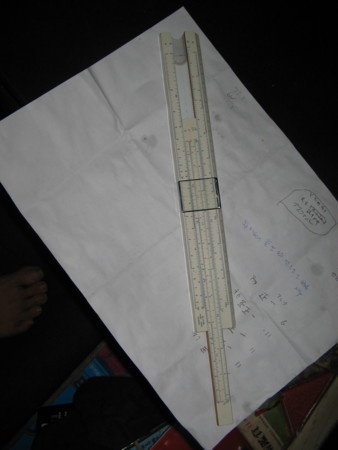
"Revival of slide rule in education" Cram school instructor Rei Morishita 40
When I was a junior high school student, there was a "slide rule" in the curriculum of the class, and I remember buying a textbook and studying it myself because of the fun of its principle. Just as abacuses were required for commercial students, slide rules were required for science and engineering students. I'm not good at addition, but I could say that the slide rule is a magic stick that demonstrates outstanding power in multiplication, division, exponential calculation, and trigonometric function calculation. It can be said that it is a representative of analog type computers.
Of course, in terms of comprehensive functions, it is not as good as a digital computer, but even so, I think it is too much not to tell students about the existence of this calculator. As an application of the theory of logarithms in mathematics, the slide rule is worthy enough just as a teaching aid to teach students "visually" about logarithms. Computers are not just computers.
Leading the students' interest in only one direction is also negative in terms of diversity.
"The above is a letter to a newspaper company."
A slide rule is a tool that "visually" scales the mathematical concept of logarithm. The slide rule is divided into outer scale, inner scale, and cursor parts. In mathematics, there is a formula LogA+LogB=Log(A*B), but the scale of A (outer scale) is assigned with a logarithmic length scale on the scale, and the scale is moved to B (inner scale). Align "1" on the scale and read the scale of B with the cursor, it will be the "sum" of the logarithms of A and B, and as a result, the number A*B will be displayed. The prominence of the logarithm is deeply felt in the way that the sum of the lengths indicates the product. The same holds true for other calculations, such as the quotient for length differences.
This tool is a collection of mathematical, scientific and engineering wisdom that has been steadily continued since ancient times. It seems that the stupid officials of the Ministry of Education, Culture, Sports, Science and Technology are excluding it from school programs, as if "it is unnecessary because there is a computer". As I have said, slide rules are foolishly thought to be worth continuing to teach as analog calculators. I think it's a dangerous trend to eliminate all analog things while all phenomena are being streamed digitally.
#slide rule#education#magic stick#logarithms#analog#digital#it's a dangerous trend to eliminate all analog things#mathematics#essay#rei morishita
6 notes
·
View notes
Text
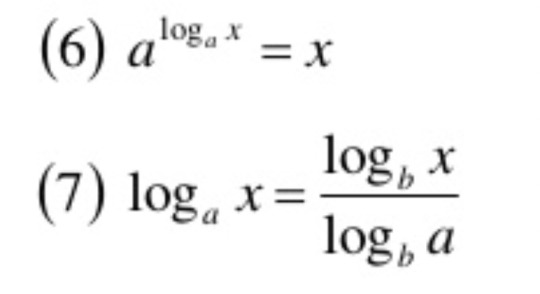

1 note
·
View note
Photo

William Oughtred was born on March 5, 1574. An English mathematician and Anglican clergyman. After John Napier invented logarithms and Edmund Gunter created the logarithmic scales (lines, or rules) upon which slide rules are based, Oughtred was the first to use two such scales sliding by one another to perform direct multiplication and division. He is credited with inventing the slide rule in about 1622. He also introduced the “x” symbol for multiplication and the abbreviations “sin” and “cos” for the sine and cosine functions.
#william oughtred#mathematics#inventors#slide rule#logarithmic scales#science#science history#science birthdays#on this day#on this day in science history
2 notes
·
View notes
Text
fun fact: You wanna know how you calculated trigonometric functions and logarithms (very handy for complex multiplications!) before calculators?
You had tables!

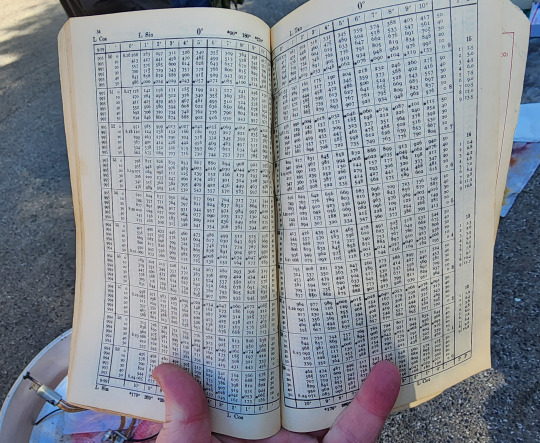
yeah it's just a book of lots of numbers. these were worked out by hand. It's hundreds of pages. This (along with your slide-rule) was essential to every math student.
This one is a 1959 reprint of a 1943 original
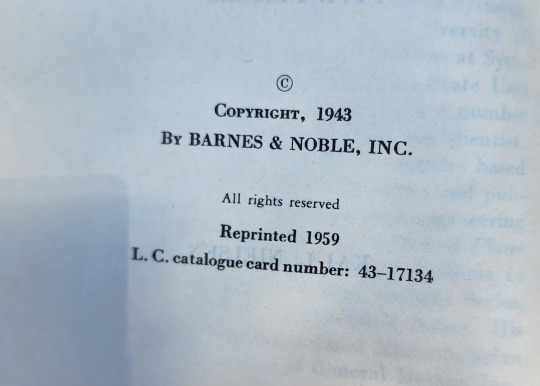
888 notes
·
View notes
Note
clapton davis fic where hes just like, super flirty and its really cute and the reader is oblivious to this but eventually clapton is like "damn it why cant you get the hint" so he opens up to the reader?&;&:& tysmm
━━ UNSUBTLE SUBTILITY



'୧ ‧₊ pairing: clapton davis x reader
warnings: swearing, brief depictions of blood
word count: 2500+ ⋆ ✩‧₊

The presence of Spring in Grizzly Lake brought a lot of things; including sporadic bursts of heaven-yellow sunlight, greenery spiraled across branches of previously barren tree skeletons, and, most importantly for students of Grizzly Lake High School, the promise of the Spring Fling Formal that was set to occur in the midst of May.
For Clapton, this prom meant one thing; achieving his goal that’s been looming over him since freshman year — ask you out. Theoretically it’s a simple process, but if it was truly as easy as it sounds it would have occurred the very moment his eyes landed on your figure that first day in beginner spanish.
You were the embodiment of perfection, punctuated through your gleaming smile that enraptured anyone in a ten mile radius, and the way the sun seemed to spread across the expanse of your cheeks, soaking you in the rays of heaven itself. Clapton was about ready to propose that day, and he didn’t even know your name.
Now, roughly two years later, he was still amidst the same dilemma, the one in which he actually had to do the asking-out part. He was sure by now you would have picked up on his inherently obvious attempts to entice you, but you remained oblivious, so he decided he’d have to fully commit if he wanted to capture your attention. The art of unsubtle subtility, if you will.
And so, forty three minutes into the depths of an agonizingly dull pre-calculus lesson, he confidently taps your shoulder with a fractionally tense hand, and indulges the tug on his heartstrings when you turn around, framed by the delicate glow of mid-morning spring that he adores so much.
“Something wrong, Clapton?” Your voice cleaves through the classroom ambience of idle chatter and textbook pages being flipped. He flashes a boyish smile in hopes to flutter your heart in the same way you flutter his.
“Do you get any of these questions?”
“Yeah, they’re not too bad,” you reply, offering an ephemeral that renders his throat tight.
He glanced down momentarily at his worksheet, adorned in scrawls and scribbles, yet lacking a single legible answer. His vision trains up back to you though, as it always does. He thought you’d easily detect the unspoken question for your help, but you remained stationary in your seat, as if waiting for him to say it. He couldn’t tell if you were genuinely that heedless, or if you were toying with him. Cat and mouse.
“Seriously? When did they even teach us all this?”
You shrug mindlessly, and a lock of hair shifts from its position on your shoulder. He’d give anything to rope his fingers through it. “A while back. Why, you need some help?”
Yes. He’d like your help, your compassion, your hand in marriage…
“Wanna walk me through it?” He tosses you a hopeful expression, and you answer back with a simple nod, sliding your chair along the cheap linoleum floor with a scrape, until the pair of you are sharing his desk, impossibly close.
Your velvet voice is stringing sentences right down the expanse of his spine, though your attempts to help him understand logarithmic differentiation were ultimately futile— how was he supposed to concentrate on anything when he could feel your words blooming on his skin? See every freckle and divot etched into your face? He could taste his own heartbeat as it melded against his throat.
“So, this helps to avoid complications like the product rule and the quotient rule when— Clapton?”
He cocks his head up, trying to ignore the swell in his stomach when he hears the way his name sounds braided between your sentences, it suits your voice so well.
“Yeah? What’s up?”
“Are you even listening?”
Shit, no he absolutely wasn’t. How could he? Your proximity allowed him to see you. Like, properly see you.
“Yeah. Totally. Logaramic thingyation,” he murmurs with overt certainty, and a puppylike grin.
You snicker. “Couldn’t even get the name right?”
He’s internally collapsing, though he manages to force some words out of his struggling brain.
“Hard to think when you’re here.” He doesn’t dare sever the eye contact between you, hoping to hone the tension as long as possible, until he shatters you. His lopsided grin shrinks in a moment of brevity; you’re so close and he can smell you and your very essence. He’s sure that his ulterior motive is conveyed, through the way his eyes explore the breadth of your figure, never leaving, never faltering— yet to his pure irritation, all he gets is a blank expression and a confused chuckle.
“Why is that?” You ask, and he wants to grab you by your shoulders and shake you. Are you really that dense? Your face is about as expressive as a rock, and you seem not even partially affected by the flirty wink he sent your way moments prior.
“You’re kidding, right? Come on.” He fires back, raising a brow with a daring smirk. He wants you to inquire. You don’t. He realizes that trying to get you to take a fucking hint was about as impossible as teaching him calculus.
You force out an awkward laugh that makes his skin crawl with defeat, but he doesn’t back down. “Come on what?”
He refrains from the urge to say “me”, and instead huffs a sharp exhale through his nose. He’s moments away from spouting some lame compliment when the shrill cry of the bell interrupts his train of thought, and a tide of students eject eagerly from their seats and spill out into the corridor for lunch.
Your friend approaches the desk with a quirked brow, reaching for your arm and mumbling something into your ear that’s intelligible to Clapton, tugging on you to try and steer you away from the classroom. And from him. You nod in response to her comment, before momentarily glancing back over to Clapton.
“I gotta go, Clapton. See you soon though, see you in History!” You send him a parting wave with a gentle flick of your wrist, before turning off and disappearing down the long stretch of corridor beside the classroom. His eyes follow you for as long as possible before your figure is consumed by the wandering horde of students, and he lets a grumbly sigh escape his parted lips before he packs up his belongings. This was going to be harder than he anticipated.
*:・.・゜゜・
Clapton’s second attempt at alluring you resulted in more or less the same outcome. He’d entered the cafeteria, instantly bathed in the overwhelming odor of lysol and lard. His prior plan was to grab a doctor pepper, maybe a sandwich, and head over to his typical table to talk a painfully uninterested Sander’s ear off about you, but he scrapped it upon spotting you waiting in the cafeteria line, immediately changing course and veering over in hopes of a successful conversation.
He cuts in front of an unsuspecting freshman, ignores the irritated “What’s your deal man?”, and ‘accidentally’ brushes up to you until your bodies knock, and you spin around in confusion.
Your face mildly relaxes in recognition, and he takes this as progress.
“Hey. Getting lunch?”
“What else would I be doing?” You ask. Swing and a miss.
He clears his throat a fraction, not allowing this to throw him off his game.
“I dunno, maybe you just really like standing in lines,” he teases, and you laugh back.
“Especially if the line is for overpriced cafeteria food,” you add with a grin.
The pair of you share a laugh, and Clapton marvels at the fact that you can look so irresistible even in the harsh fluorescence of the cafeteria’s artificial lighting. The pair of you fall into a partially awkward silence, and he follows your line of vision, watching as you observe some students hanging a hand painted banner advertising prom for the entirety of the cafeteria to see. ‘Spring Fling Formal, get your tickets now!’ glistens in white gold lettering. He prays he can take the banner up on that offer.
“Are you doing anything for it?” A bit of a jump from the casual conversation, but he was itching to entice you and couldn’t risk missing his chance.
“Hm? For what?”
His lips twitch into a gradually familiar downwards smile. “Prom,” he says, gesturing at the banner, obnoxiously pink in hue and decorated with scatterings of hastily painted daisies.
“Oh. Maybe— I’m not sure, it’s kinda ages away.” Yup. An impossibly distant period of two weeks. Clapton’s jaw ticks uncomfortably at the prospect of the narrowing window of time. He can’t afford to screw this up.
“Right. Sure. Are you… interested in anyone in particular though?” He probes, hoping that you notice the searing spark of desperation that lingers in the loop of his irises.
“Eh. Not really. Are you?”
His ego suffers a blow at your total ignorance to his pining. He’s on the brink of combustion; unable to endure the cosmic irony of having you so close yet so far. He pictures you for the umpteenth time, glittering in a dress that matched your eyes and his tie. A slow dance to a Sting song, his eager hands situated either side of your waist. You’d stare up at him with a dazzled guise, illuminated by the scintillation of indigo disco lights, and his tongue would delve into yours as he soaked up the saccharine flavor of the fruit punch lingering on your lips.
“Yeah.” He states bluntly, staring at you as if you hung each and every star. “Yeah, I’m interested in someone.”
You raise a brow. “Oh yeah? Who?”
He clears his throat. “Someone special. Someone super special.”
“You should ask them!”
“Easier said than done,” he chuckles humorlessly.
Your lips part as you go to investigate further, but are interrupted by the scowl of the lunch lady barking at you for your order. He notes it, mac and cheese plus a diet sprite— you’re handed it moments later, and your vision is torn from him and towards your small circle of friends seated across the cafeteria, who are waving you down. You’re gonna leave again?
“I better go sit down, but, uh, you should definitely ask that person to prom. Be upfront and everything. Y’know, you only live once, and all that, right?”
He swears he’s going to implode at the unbridled irony of this entire situation. Be upfront. He’s been upfront!
“You know it,” he quips weakly as you slink away.
He’s been showering you in signals for months, and you’d always abandon them, his attempts for your acknowledgement left festering as sour memories in his head, things that made him roll over with shame in bed at night, and all for what?
He brainlessly orders his doctor pepper with a monotone grumble, feeling the frigid prick of the can’s condensation gather in his palm as he wonders what the hell it’s gonna take for you to take a damn hint.
*:・.・゜゜・
After yet another failed interaction, Clapton had spent the span of the rest of the week stripping his words to the marrow. Every conversation he indulged in with you involved his inner thoughts spouted in their rawest form— cocky compliments, lingering touches, looks of intense pining and yet somehow you continued to miss them. Every. Last. One.
He was nearing his wits end, teetering on the cliff of insanity and seconds away from taking the plunge. Maybe he was the one who needed to take a hint. Maybe you were trying to tell him that you weren’t interested and he wasn’t giving it up. It was a sickening notion, one that thrashes wildly in his stomach. He didn’t know much, but he did know that he’d never be satisfied until he knew your stance on him for certain.
He was just gonna say it.
In hindsight, it wasn’t Clapton’s smartest move to deliver the question in the midst of a dodgeball game, but his thoughts were warped and he decided now was as good as ever. His voice was barely even audible beside you over the screech of tennis sneakers scraping the gym floor and the continuous sound of rubber balls coming into contact with student flesh.
“Hey!” He exclaims.
“Hey?” You say back, turning to him momentarily. Yet again, he wonders how you do it. Hair blown back effortlessly, skin glistening with a fragile sheen of moisture that is hardly off-putting, if doing something it aids to soften your otherworldly glow. Meanwhile, he was panting like an old dog, hair matted to his forehead in sodden chunks beneath his obnoxious sweatband.
“I needa ask you something!” It’s sink or swim. His teeth graze the inside of his cheek for a moment, his gaze varying between you and the opposing court, to prevent a dodgeball to the head.
“Yeah?” Sink or swim sink or swim sink or swim. “What’s up?” He melts at the sight of your semi-breathless smile.
“Are you still dateless? Like, to prom?”
Your forehead creases, and you return the sideways glance. “Um, yeah. Why?”
With a delayed exhale that rings heavy in the pits of his lungs, he turns his entire body to face you, which in turn makes you face him as well.
“Look, I’ve been trying to say this for months. Well, not months. Maybe weeks. Whatever– point is, it’s been a while. Like seriously, a long fucking time. And I swear I’ve been so obvious, but clearly not obvious enough because you’re still, like, totally unaware or whatever. But, like, basically, I was wondering— I’ve been wondering if—”
“Clapton!” You exclaim hurriedly, splintering his stammered sentence in an instant. He barely has time to cast his visage front on, before a dodgeball with an extremely strayed trajectory soars gracefully through the current of the air and hits Clapton square in the face. Guess he wasn’t paying enough attention after all.
An expletive leaves his lips, muffled by the wail of your gym teacher’s whistle. His head is temporarily a warped whirlwind resembling TV static, though the feeling fades fairly quickly.
You turn to him in a mild panic, noting the faint trickle of glossy crimson that has started to spill from his nose. “Holy shit! You’re bleeding! Lemme take you to the nurse.”
He can’t help but twist his lips up to form a slight smirk as you place a worried hand on his bicep. The touch scars on his nerves, your fingers like an angel’s caress.
In all honesty, he feels fine, but you offered to take him to the nurse— was he going to give up that delightful invitation? No. He was not.
The pair of you are excused from the gym, trekking down the hallway in an atmosphere of silence so thick it’s practically tangible. Upon arrival at the nurse, Clapton’s seated in a shitty plastic chair, holding a paper towel held to his nose and tipping his head slightly backward. He couldn’t believe that his one chance of actually spitting his desperate question out was interrupted by a stray dodgeball. A goddamn stray dodgeball.
You linger in the doorframe, taut as a coiled spring. The nurse, underpaid and painfully unsympathetic, leaves the pair of you once she deems Clapton to be ‘good enough’, in her exact words.
You approach him, taking the scarlet-spotted tissue and holding it to his face for him, a gesture which turns his insides in on themselves.
“Hey Clapton? What were you saying before?”
Shit.
“What?” He croaks gutturally, trying and failing to play dumb. He knew damn well what he was saying. Prom with him.
“You were asking me something. Before you got, y’know, obliterated by a flying dodgeball.”
He snickers feebly, even if for a moment. “Oh, yeah.”
You open your eyes wider as if to say, “Well?”
The climate in the room seems to sink heavier, cradling the scent of antiseptic and drying blood. Clapton’s words fizzle out on his tongue no matter which way he arranges them in his head, but he knows he just has to get it out—- rip off the band-aid, break the ice, all of that.
His eyes, big and wide and drinking in your face so dangerously close to his, melt into an unmistakable question. He counts himself down in his head. Now or never.
“Prom. I was asking if you wanna go to prom.” He takes a staggered breath. “With me, I mean.”
Oh.
Oh.
The genuine beam you erupt in subsequent to his words is enough to ease his nerves. It’s enough to make him soar, actually.
“Why didn’t you say anything?”
That wasn’t a no. That wasn’t a no. His heart hurts with hope.
“I tried to. You’re just… you kinda suck at taking hints.” He chuckles.
You roll your eyes, picturing every moment leading up to this one that you spent with him. Upon further reflection—- yeah. Yeah, you clearly did. People don’t look at friends the way he looked at you.
“Shit, I kinda definitely do,” you murmur.
He doesn’t let the quiet last long.
“So…?”
“Oh. Right, yeah. Clapton, I’d love to go to prom with you.”
The smile he wears is irresistibly contagious. Finally. Finally. Two long years of craving you; two years of memorizing every quirk and curve and contour. He knows it’s sort of ridiculous to get so elated about some forgettable high school dance, but the image he can see so vividly in his head; the lights and the dress and the swarm of butterflies that comes with your killer smile… it’s worth every awkward exchange, every word that’s fallen on deaf ears.
“Seriously?” He asks, reaching for your hand and wallowing in the way you so brainlessly accept the touch.
“Seriously.”
“Good. You won’t regret it.”
And something inside you tells you that he’s absolutely right.
reminder, my requests are always open
masterlist
✩‧₊˚
#clapton davis#clapton davis x reader#clapton davis x you#josh hutcherson#detention 2011#clapton davis x reader fluff#clapton davis fluff#mike schmidt smut#mike schmidt fluff#josh hutcherson x reader#josh hutcherson imagine
141 notes
·
View notes
Text
Think of Megafauna as the evolutionary equivalent of The Rich
no no no, hold on with me a second
matter and energy are finite. an ecosystem is, essentially, a group of organisms in a particular location balancing each other out in order to allow for matter and energy to flow in a constant cycle
that balance requires each species to reproduce to the best of its ability, and all the species around it to take advantage of that reproduction to the best of their abilities
the larger you are, the more energy and matter you need to survive. yes, if you're bigger, you can have an advantage over other species in getting food (either by being able to reach more of it, or overpower things to get to it, that kind of thing). but you have to make up for it by eating more. a LOT more. it scales up logarithmically.
because bigger species need more resources to exist, they aren't able to spend as many on reproduction, meaning that - as a rule - bigger species have smaller populations. which is an evolutionary disadvantage. but not their only one.
in a way, they are hoarding matter and energy in the bodies of a select few, that gained larger size in order to access more matter and energy. which, yes, every species tries to do, but at smaller sizes, its sustainable.
smaller species have larger populations, which then speciate more so that more offspring can live and occupy new niches, which then leads to more speciation because niches beget niches, and so on
yes, bigger species can also strike that balance, but they sit on the top of a precarious peak. they rely on that entire system to continue to function in order to fuel their large size and successful populations.
so bigger species tend to evolve in systems where there are not selection pressures for them to be economical. and most bigger species do not have much in the way of modern descendants.
because the minute their ecosystem starts to fall apart, they can't get enough food.
and they go extinct.
megafaunalism is just a different kind of specialization, and niche specialists have to be very lucky to survive mass extinctions.
we see this in every extinction. end ordovician, end devonian, end permian, end triassic, end cretaceous, the current one. megafauna go first.
the main difference between megafauna and Human Wealth Hoarders is that megafauna aren't making a conscious choice. Human Wealth Hoarders are.
and, much like megafauna, as the system they rely on collapses, they will be the first to go extinct. there's fewer of them, and they're more vulnerable. poorer people, much like smaller species, will lose many members - but, because there are more of us / smaller species are significantly more diverse, we'll/they'll ultimately get through it a lot easier.
the only reason we think megafauna = good is because *we're* megafauna. not only megafauna, but the highest trophic level (ie "top predators", which, given everything gets decomposed in the end, sure is an extremely revealing way to phrase it in terms of the psyche of the people inventing the term). we've convinced ourselves that being at the "end" (there is no end. we all get decomposed) of the "food chain" (it's a circular web) is best because that's where we are, and it gives us more power and control.
but just as toxins in water concentrate in "top predators", so do the stressors of ecological crises disproportionately affect megafauna. and us.
smaller is more diverse, more speciose, because they can. and evolutionarily speaking, more diverse = winning. because you're more likely to keep playing the game in the future.
so yeah. bigger is worse, actually.
395 notes
·
View notes
Note
Oh michael is defo a dom! He gives me “pushes his glasses up on his nose eyes in his book telling y/n this dick aint gonna suck itself while paying hee no attention”
Yeah right??? And I might be absolutely off the mark, but he gives off these "distant dom" vibes???
I'm sorry for the filth so early in the morning
Like yes, he loves you and understands the importance of aftercare and being with you when you subdrop, but when the mood strikes, you're on your knees, observed from a distance, the same way he would a complicated logarithm. Whatever goal he wants for this session, he's doing the maths in his head: if I do this, then the outcome should be this, let's see if I'm right.
And he gives off the vibes of a very strict dom? There's no first, second or third strike with him: you're not following the rules? Are you being a brat? You get punished immediately and there's no way around it: you can say you're sorry, that's nice to hear, but you'd better get your arse over here, now, before he loses any more patience. And the punishment is not about pain, more fucking with your brilliant mind? Because you are smart, or you two wouldn't have clicked, but now you are sitting with your back against his chest, legs spread, three of his fingers deep inside of you and a simple math problem in front of your eyes and you can't focus, because he's too distracting and you need to find the solution before he makes you come, or you'll see what he has in store for you. But his thumb is on your clit, his fingers crooked that perfect way and your brain is unravelling. You are fighting, desperate to keep you orgasm at bay and he's just staring at you, half smile on his lips, cool and collected, just waiting for you to fail. Only then, you two will have some real fun.
64 notes
·
View notes
Text
A post about math
do you ever get confused why you can't raise negative one to a fractional exponent? if we try, we can two get different results for the same expression:

this is all because there are two (2) different "power" operations taught to you in school. wow. one works by repeated multiplication, and the other is defined thru natural logarithms 0_0
let's go thru the process of inventing it from scratch. so if we want to repeatedly multiply something, we just need a multipliable number and a counter to count the multiplications. it doesn't make sense to multiply zero or a negative number of times, so the exponent has to be a nonzero natural number. but we can easily extend it to all integers, if our base is also dividable and has a multiplicative identity (i.e. it's a member of some Field). i'll just take the real numbers for now.
but extending to real exponents is a bit harder. it doesn't make any sense to multiply something a fractional number of times. so we have to rely on the exponent "product rule": when you multiply two numbers, their exponents add.

if you do some tricky math (which i don't remember shhhh), you can prove that the only function, that satisfies this relationship, is e to the x (or exp for short). we can now use it to expand our definition to all numbers, for which we can define The Natural Logarithm (epik). but that doesn't include negative numbers at all. so the previous definition is still useful.

if you're feeling extra fancy, you can even use this infinite sum definition for exp. this way our exponent can be literally anything even vaguely resembling a number. like a matrix, for example :)
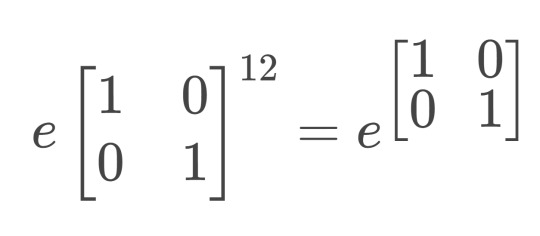
here's an example of how you can (but probably shouldn't) use this knowledge. the matrix powers here are actually different operations
#math#numbers#exponents#mathblr#textpost#longpost#tumblr just ate half my post wtf#don't press ctrl+z when writing a long post#you're going to have a heart attack#latextpost
72 notes
·
View notes
Text
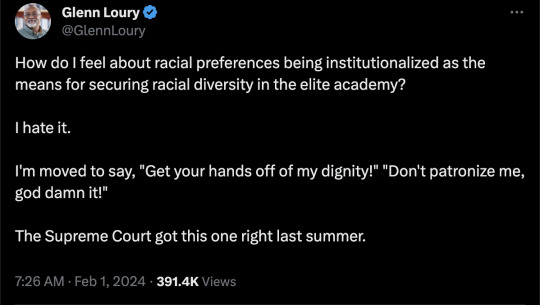
I was a brilliant kid from the age of 8, 9, 10 years old. I was doing slide rules. I was doing logarithms, tables, and stuff like that. I was doing solid geometry when I was in 7th, 8th grade. I was always a super-smart kid, a little bit like the Matt Damon character in Good Will Hunting. I was a working class kid. I didn't have a lot of polish, but I had real sharp smarts.
My life took a various turn. I was a father at 18 and at 19 and at 21, and dropped out of college. I bounced around community college, got discovered—like Matt Damon in the movie—ended up at Northwestern University where I was a wizard. I got all As in everything: math and economics and philosophy and German. And I was taking graduate-level courses in mathematics and in economics when I was an undergraduate at the college. I was taking the PhD level courses in these technical subjects and acing them. I went to MIT, where I was at the top of my class again.
Forgive this, but I want you to try to understand the point. My genius—yes, I said it—my gift, my extraordinary abilities were what carried me forward, notwithstanding the vicissitudes of racism and discrimination in America. To have that minimized by somebody presuming that, “Oh, you didn't get to MIT without affirmative action” ... and it's actually true. I didn't get to MIT without affirmative action, because every black person is going to be the beneficiary of affirmative action whether they ask for it, need it, or not.
I had a fellowship. Pretty much everybody in the first year PhD class at MIT had a fellowship of one kind or another. Mine came from the Ford Foundation Doctoral Program for Minority Students in Economics. So it was an affirmative action fellowship. MIT had three positions set aside in its entering class. They usually would have 25, but for a few years they had 28. And those three were to be black students of the greatest promise. I was one of them in the year that I came in, even though I didn't need to be in that box in order to get in because I had As in everything. In the PhD level courses I was taking at Northwestern, my professors were writing letters saying that I was the best student they'd ever seen. Because I was.
Again, I ask for your forbearance as I toot my own horn here. Goddammit, don't dishonor my amazing achievement by chalking it up to favoritism! I resent it. I don't like it. I don't need it. I don't want it. That's not a political position. I'm defending my own dignity here. So you gonna call me a sellout because I'm defending my dignity? Fuck you! That's my position
John McWhorter: Glenn, they're gonna use that.
It was not a performance. It was honest. Please, will you get your hands off of my dignity? Let me succeed or fail based upon my abilities. Don't patronize me, goddamnit!
#Glenn Loury#John McWhorter#affirmative action#Good Will Hunting#racial discrimination#bigotry of low expectations#academic corruption#merit#meritocracy#make merit mater#religion is a mental illness
7 notes
·
View notes
Text
Stuff about the Kelly criterion
I’ve been off Tumblr for a little while, but there’s apparently been some discussion about the Kelly criterion, a concept in probability, in relation to some things Sam Bankman-Fried said about it and how that relates to risk aversion. I’m going to do what I can to explain some aspects of the math as I understand them.
The Kelly criterion is a way of choosing how much to invest in a favorable bet, i.e. one where the expected value is positive. The Kelly criterion gives the “best” amount for a bunch of different senses of “best” in a bunch of different scenarios, but I’m going to restrict to one of the simplest ones.
Suppose you have some bet where you can bet whatever amount of money you want, you have probability p of winning, and you gain b times the amount you bet if you win. (Of course, if you lose, you lose the amount you bet.) Also suppose you get the opportunity to make this bet some large number n of times in a row, you have the same probabilities and payoff rules for each of them, and they’re independent events from each other. The assumption that all of the bets in the sequence have the same probabilities and payoff rules is made here to simplify the discussion; the basic concepts can still hold when there are a mix of different bets, but it’s a lot messier to state things and reason about them.
Also suppose that your strategies are limited to choosing a single quantity f between 0 and 1 and always betting f times your total wealth at every step. This is a pretty big restriction, and it too can be relaxed at the cost of making things much messier. But even with this restriction we’ll be able to compare the strategy prescribed by the Kelly criterion to the “all-in” strategy of always betting all of your money.
So what is the best choice of f? The Kelly criterion gives an answer, but the sense in which it’s the “best” is one that it’s not obvious should apply to any choice of f. I’ll state it here but keep in mind that until we’ve done some more calculation, we shouldn’t assume that that there is any choice of f which is the best in this sense.
The Kelly criterion gives a choice of f such that, for any other choice of f, the Kelly criterion produces a better result than the other choice with high probability. Here “high probability” means that the probability that the Kelly choice outperforms the other one goes to 1 as n goes to infinity.
So why is this possible?
Let Xi be the random variable representing the ratio of the money you have after the ith bet to the amount you had before it. So your final wealth is equal to your starting wealth times the product of the Xi for i from 1 to n. Also these Xi are independent identically distributed variables. (We can describe their distribution in terms of p, b, and f but the exact details aren’t too important to the concepts I want to communicate.) Sums of random variables have some nicer things that can be said about them than products, so we take the logarithm. The logarithm of your final wealth is the log of your starting wealth plus a sum of n independent variables log(Xi).
Now, the expected value of that sum is n times the expected value of one of the individual summands, and the (weak) law of large numbers tells us that with high probability the actual value of the sum will be close to that. (To be rigorous about this: For any constant C, the probability that the sum will be further than Cn away from its expected value goes to 0 as n goes to infinity.) So for any betting strategy f, define r(f) to be the expected value of log(Xi). So if we have any two strategies f and f’, the log of your final wealth following strategy f minus the log of your final wealth following strategy f’ will be about r(f)n-r(f’)n, and so will be positive with high probability if r(f)>r(f’). (If you understood the rigorous definition in the previous parenthetical, you should be able to make this argument rigorous as well.) Thus with high probability the log of your final wealth will be greater using strategy f than strategy f’. Since log is an increasing function, this is equivalent to saying that with high probability, f will result in a greater final wealth than f’.
Then if you pick f such that r(f) is maximized, then for each other choice of f, you’ll outperform that choice with high probability. This is what the Kelly criterion says to do. Maximizing r(f) can be equivalently described by saying that at each bet, you bet the amount that maximizes the expectation of the logarithm of the amount you’ll have after the bet.
A pitfall to avoid here: Although the log of the final wealth can be said to be “about” a certain value with high probability, we can’t really say that the final wealth is guaranteed to be “about” anything in particular. Differences that we can consider to be negligibly small when we’re looking at the logarithm can balloon to very large differences when we’re looking at the actual value, and it is very possible for one experimental trial using a given strategy to yield something many times larger than another trial using the same strategy where you’re a little less lucky.
The Kelly criterion is not the strategy that maximizes the expected amount of money you have at the end. The best strategy for that goal is that is the one where you put all of your money in on every bet. This isn’t inconsistent with the previously stated results; in almost all cases the Kelly criterion outperforms the all-in strategy (because the all-in strategy loses at some point and ends up with no money). But in the very unlikely event that you win every single one of your bets, you end up with an extremely large amount of money, so large that even when you multiply it by that very small probability you get something that’s larger than the expected value of any other strategy.
What if, instead of trying to maximize the expected dollar payoff, you have some utility function of wealth, and you’re trying to maximize the expected value of that? Well, it depends what your utility function is. If your utility function is the logarithm of your wealth, the Kelly criterion maximizes your expected utility; in fact, in this case we don’t even need to assume n is large or invoke the law of large numbers. But going back to the case of large n, there are a lot of other utility functions where the Kelly criterion is also optimal. Think about it like this: the Kelly strategy outperforms any other strategy in almost all cases; the only situation where you might still prefer the other strategy is if in the tiny chance that you get a better outcome, your outcome is so much better than it makes up for losing out the vast majority of the time. So if your utility function grows slower than the logarithm, you care even less about that tiny chance of vast riches than you would if you had a logarithmic utility function, so the Kelly criterion continues to be optimal. More generally, I think it can be shown that when comparing the Kelly criterion to some other strategy, the probability of that other strategy doing better than it decays exponentially in n. Since the amount the other strategy can obtain in that tail situation grows at most exponentially in n, this implies that as long as your utility function grows slower than nε for all ε>0, you won’t care about the tail so the Kelly criterion is still optimal. If your utility function grows faster than that, i.e. if there is some ε>0 such that your utility function grows faster than nε, then I think for sufficiently favorable bets, all-in comes out ahead again.
Okay but how does this all of this apply in the real world? Honestly I’m not sure. If your utility function is your individual well-being, it seems very likely to me that that grows logarithmically or slower; if what you care about is maximizing the amount of good you do for the world by charitable donations, I think there is some merit to SBF’s argument that you should treat that utility as a linear function of money, at least up to a certain point. But even he acknowledged that it drops off significantly once you get into the trillions, and since the reasons for potentially preferring riskier strategies over the Kelly criterion hinged on exponentially small probabilities of exponentially large payoffs, I think that that trillion-dollar regime might actually be pretty relevant to the computation.
Really any utility function should be eventually constant, but in that case the Kelly criterion ceases to be optimal in the way discussed before. For large enough n, it will get you all the money you could want, but so will any other strategy other than all-in and “never bet anything”. Obviously this is not a good model of how the world works. To repair this we probably want to introduce time-discounting, but to make sense of that we need to have some money getting spent before the end of the experiment rather than all of it available for reinvesting, and by this point things have gotten far enough away from the original scenario that it’s hard to tell how relevant the conclusions from it even are. It seems like it’s a useful heuristic in a pretty wide range of scenarios? But I have no idea whether SBF was right that he was not in one of them.
To be clear, none of this is to excuse his actions; whether or not he should have been applying the Kelly criterion, I think “committed billions of dollars of fraud” does a better job of capturing what he did wrong than “was insufficiently risk-averse”.
#tumblr allowed me to use subscripts in the post editor and they show up fine on my blog but not on the dash#math
69 notes
·
View notes
Text
Alpha testing, v0.11a & patchnotes: The dark side of RNG
In the v0.10a build blog that L had tested, I had mentioned that the enemy AI’s targeting was not working, and they were mainly using defensive moves or otherwise acting passively. Well, as you’ll see in the patchnotes below, the AI was indeed turned on, which led to some... interesting developments.
Ye olde RNG
It’s always valuable to get feedback from new players, as both M, Z, and myself were quite familiar with the game now. Over subsequent iterations testing, the early game may have become a bit overtuned, in the enemy’s favor. These included:
Flat stat increases per level rather than a logarithmic curve that front-loads the stat gains
Slightly increased encounter rate in the first area
Slight debuffs to the overtuned starting moves
Now, considering this is an SMT-style game, I am perfectly fine with the early game being a bit of a rough start until you get a full party. However, the starting area’s RNG in SMT games are a lot gentler to compensate, whereas here one has to deal with:
1 or more enemies spawning from any faction
RNG part drops
and RNG recruitment chances.
And on the whole, I was correct in that on average, one was statistically likely to make decent progress during the early game. A few levels and any gear drops generally makes fights much more even, but the downside of using RNG as a mechanism to add variation and excitement to the game means that sometimes, you just get unlucky. Of course, I consider running from encounters a necessary part of the game, but running away all the time when first starting out isn’t very fun!
A great suggestion L had to remedy this was to only allow certain weak enemies to spawn in the first area. This will ensure that one will have encounters tuned to their specific level of power, and the reduced variance in enemies will ensure that they can build a general strategy to deal with the units in the area. I’ll be working on implementing this later on.
Visual clutter
The worse your Astronaut’s condition is (low health, energy, oxygen, number of bad status effects) means a worsening of visual effects. My design reasons for this are numerous but in short, it serves as a warning to the player, it adds immersion, and it adds a small amount of visual difficulty. While I stand behind these decisions, I can understand not everyone will appreciate this, and especially in the early game where one is trying to learn the game, adding this visual noise is likely to add to the frustration, and detract from learning the rules of the game.
This definitely affected my friend L, and as such I’ve allowed one to set the intensity of the effects to zero (previously you could only go as low as 5%). Furthermore, I have another option planned that lets you customise the amount of time the screen stays glitched before it goes away. Purists (like myself) can set this to 100% of the time for a challenge, while those that aren’t keen on them can set them very low, or off if desired.
I’m sad to see that my effects were not as well-received as I’d hoped, but that’s the whole point of testing! M and Z didn’t mind it as much, which was interesting. Obviously, the glitching isn’t going anywhere, but now it can be removed if one so desires!
And that’s about it for these notes - you’ll be seeing a couple more playtest blogs in rapid succession because I happen to be a god at fast turnarounds (not really, it’s just that I fixed a lot in this version and the next couple of tests were quite short). Patchnotes, as always, are below:
v0.11
Features:
Routine now tells you why it is unavailable
Mouse cursor now becomes hidden after a period of it not being moved
Controller right stick now moves the mouse cursor!
Shows kmown enemy affinities during move selection
Shows targeting locations during move selection with enemy dimming
Mouse controls for selecting planets!
Mouse controls for choosing attack target!
Added doors! (Sprite + turning + tooltip)
Polish:
Darkened move text if it's on cooldown
Changed destroyed icon's colour based on team in routine summary
Enemy AI doesn't prioritise applying an already-applied status effect
AI doesn't kill themselves unless their cost is like way above their remaining hp
Carpet bomb's description changed: "standing on the ground" -> "in the lower row"
Turned down frequency of visor effects
Added tutorial about scanning enemy more than once
"hopes and miracles" -> "miracles, hopes, and dreams"
When mouse tooltip is shown, the mouseover stat panel is hidden
Move kamikaze flag in movedb now flags when a move that costs HP should be used when on very low hp
Made AI control limit message imply it can be increased later on
Stopped mouse interaction during the gameover sequence
Allowed mouse clicks to advance the gameover sequence
Slowed tutorial spam
Made right click during targeting selection cancel it (until you mouse over the attack menu again)
IN TRANSIT now appears when flying
Bugs:
Welding now available to use on bottom row
AI AOE grid generation working now
Right icon displayed for AM cost on move window & ammo not overriding EN cost now
Stopped battles occuring inside a wall
Mouseover move icons in equipment panel now working
Move mouseover now refreshes when you swap parts
Fixed aerospike engine no item sprite
Fixed script picking a logid greater than the max log
Fixed picking picking a log part greater than the max number of log parts
Stopped crash related to equips grid when summoning a unit
If you get teleported down a floor and are looking at a feature, that feature does now appears
routines/null/ now is routines/<parttype> when looking at parts in ship storage
Fixed the %max resource increase/decrease status effects
Fixed big bug with how stats were being refreshed with the "always" trigger - rolled this into the stat refresher script
Fixed move costs not appearing when shown on character status panel
Fixed move panel crashing when selecting defend/retreat
Fixed deadzone calculations and stopped R stick from being used as controls as it controls the mouse
Units will correctly prioritise moves that give units a status effect they don't currently have
Fixed targeting issues where the user moves before the move happens
Fixed routine summary not working properly for elemental bursts
Element now revealed properly on burst and on 0 damage attacks
Fixed teleporting not updating the minimap
Stopped "see trap" tutorial triggering on the spawn tile
#indiedev#gamedev#gaming#pixel art#scifi#space#gamemaker#programming#rpg#robot#devblog#game#videogame
19 notes
·
View notes
Text
gods I love drawing texture i love drawing velvet i love drawing carapace i love making the light scatter and the shine spots on smooth things
i love fur, I love how it both drinks in and refracts the light
I love that polar bears have transparent hollow hair to hold heat to their bodies
science and art friends 4ever
if you want to be an artist, study anatomy study light study evolution study kinetics
When you know skin is more like a gel you can understand how to layer colors to make it feel realistic
When you learn muscles, your faces will emote so much better and your bodies will contort and bulge in the ways you know you can break the rules instead of breaking them accidentally
When you learn the various types of natural hinges, what happens when muscles are too short and too long or can bend beyond what they should, you learn how to tell a story just as well as shape theory does
And when you're into science and you learn the arts, when you turn your hands, you can understand why weavers used the precursors to the computer, why punch cards were used first, why the first printing press was a modified wine press, why embroiderers and lace artisans were still working in the tech industries into the 60's
You'll find your hands stronger as you play guitar and work at sculpture, you'll find your designs more elegant and more likely to work than your usual brutalist boxes
You'll learn about the origins of dyes and why they're important, why gold is still important to computing, why silver is important to cooking, why it can be useful to water cooling systems
By learning how ceramic works, you build better circuits
And as each learn from each other, we all become better humans because we are different yet each has so much to fucking offer the world still
We are bees, we all can learn of comb, of flower, of honey and birth and dance as we look in awe of the logarithmic spirals and golden ratio and the tragedy of a grave with the wrong spiral on it and why it took a weaver looking at stone age tools to realize what they were for
Humans, a colony of humans who do different things to help the whole
That is the ideal of art. That is the ideal of science. That is the ideal of humankind.
#art#science#up at butts o clock can you tell#isn't the world beautiful though#it's brutal too#but I learned from my despair and my joy and I let them both in and cradled them#and we'll walk forward#I can't leave either behind for different reasons#but we can dance and that'll be enough#because we can see the spira mirabilis
2 notes
·
View notes
Text
The Cube of Frangible Histories

In certain conditions which are not typically found in nature--say, the presence of a rapidly spinning parachronic charge--particles not only need not have consistent histories, they may have histories which actively contradict one another. By using a sufficiently powerful telic discriminator, the Cube can induce and magnify such contradictions to alter the history of individual macroscopic objects. This can be used to modify, repair, or destroy objects to an almost infinite degree, although not in ways which outright contradict the local laws of reality.Altering the history of a person or object does not alter history for any other person or object; they will remember history as they experienced it before you used the cube. Persons on whom the cube is used remember only their new history. The operator of the cube can use it on themselves without issues. Operation of the cube requires touch contact, but the interface itself uses sophisticated mind-scanning technology to accurately interpret the intent of the operator, which it will attempt to fulfill to the best of its abilities. If the Cube cannot alter an object’s history as desired, its surface markings will flash once. It the Cube succeeds in carrying out the operator’s instructions, its surface markings will flash twice, and it will emit a low tone. DO NOT ATTEMPT TO ALTER OR DESTROY THE CUBE OF FRANGIBLE HISTORIES BY USING THE CUBE ON ITSELF.
The energy requirements of the cube scale according to the equation 4/3 * pi * k * m * s³, where s is the difference in time between the point of divergence for the new history of the object and its former history, and the present moment; m is the mass of the object in kg; and k is a constant reflecting the efficiency of the cube under various operating conditions. Under normal operating conditions, k = 3.515 * 10^-12, and a change to an objects history will take time to propagate to the present (as perceived by the operator); this time is equal to the cube root of s.
For example, let's say you wish to use the cube to alter a map so that when it was made, the creator included information that was omitted in the present timeline. The map has a mass of 5 g, or 0.005 kg. It was created ten days ago, which is 864,000 seconds. The energy needed to alter the map is 4/3 * pi * 3.515*10^-12 * 0.005 * 864,000^3, or ~11,000 joules, and it will take about a minute and a half for the change to become visible.
A skilled operator can reduce the time required for a change in an object's history to propagate to the present, at the cost of an increase in the base energy required. To reduce the time to the fourth root of s, multiply k by 10; to reduce the time to the fifth root of s, multiply k by 100; and so forth. Additionally, the following conditions alter the base energy required to use the cube:
Presence of a static parachronic charge (k is multiplied by pi for every unit charge)
Presence of a spinning parachronic charge (k is multiplied by pi and the angular velocity of the charge source in radians per second if the source is spinning in the opposite direction from the cube's natural orientation; k is *divided* by pi and the angular velocity of the charge source in radians per second if the source is spinning in the same direction from the cube's natural orientation. To find the cube's natural orientation, examine the symbols on the surface and apply the right-hand rule.)
Presence of a countertelic disruption field ("prophecy-supressor") (k is multiplied by 10 times the field intensity in Humes)
Outsized mass: above ~153 kg, k is multipled by one plus the natural logarithm of the mass minus log(153) (about 5). So for a 300kg object, k is multiplied by 1 + log(300) - log(153) or ~1.7.
The Cube is a metal object approximately 8.3 cm on a side, with a mass of ~6.4 kg, whose outer layer is composed of a metal alloy with a yield strength of about 1800 Mpa. The Cube can be powered by an electric current, a stream of charged plasma, a direct supply of both matter and antimatter, or by charged particle radiation. The Cube cannot operate above temperatures of 550 Kelvin or below 180 Kelvin. The Cube cannot operate in the ergosphere of a black hole, inside closed timelike curves, or when exposed to high concentrations of helium. If the functional interior of the Cube is critically damaged, or if the Cube is exposed to temperatures greater than about 2200 Kelvin, the Cube’s internal power source will explosively deconstruct, releasing 7.2 * 10^9 J of energy, mixed ionizing particle radiation including alpha, beta, gamma, and neutron radiation (30-40 Sv equivalent to those within 30 meters), and inert metal fragments.
Based on detailed studies, the conjectured results of attempting to alter or destroy the Cube using itself include:
Minor malfunction: operator is stuck in a time loop that is equal in duration t to the cube root of difference in seconds between the time the cube was used, and the time at which they attempted to retcon its destruction. This loop begins t seconds before they attempted to destroy the cube, and ends at the moment they originally attempted to destroy it. If they do not attempt to destroy it or if they are dead, the loop ends. (For longer loops, the loop can be treated as if it begins with the operator's birth.) Only the operator is aware of the loop.
Major malfunction: operator is stuck in a time loop that is equal in duration t to the cube root of difference in seconds between the time the cube was used, and the time at which they attempted to retcon its destruction. This loop begins t seconds before they attempted to destroy the cube, and ends at the moment they originally attempted to destroy it. Regardless of whether they attempt to destroy the Cube or not, the loop resets. The loop cannot be escaped by any means. Death, additional attempts to destroy the Cube (by any means), the use of time travel, travel to other realities or planes of existence, entering black holes or wormholes, and attempts to cause paradoxes reset the loop. From the perspective of the rest of the universe, the operator vanishes. Only the operator is aware of the loop.
Catastrophic malfunction: same as 2, but the operator and all living creatures with the capacity for memory within 25 meters of the cube when destruction was attempted are aware of the loop. This effect includes self-aware machines and excludes non-self-aware machines, regardless of their sophistication or design.
Paradox: the Cube and all matter within 25 meters is transformed to a black hole. Due to the small size of this black hole, it will evaporate rapidly; unless stabilized (or unless an extremely massive object is caught within this radius), the resulting black hole will almost instantaneously evaporate, releasing energy equivalent to the mass consumed as black-body radiation. At minimum, this will be equivalent to the mass of the Cube, i.e., an explosion roughly the size of the Krakatoa eruption.
Failsafe: the operator is removed from history; no one remembers their existence, and the timeline is altered to be consistent with their never having had existed. The exception to this is the Cube, which remains at the location it was in when the operator used it.
Failsafe malfunction: The operator and all matter that was within 25 meters of the Cube in the original timeline are erased from history. The exception to this is the Cube, which remains at the location it was in when the operator used it.
29 notes
·
View notes
Note
It is taking everything in me not to buy a little book of logarithmic and exponential tables just because I think it would be peak math major of me to pull it out of my pocket every time someone gets on the topic.
You should do it, but only if you also get a slide rule and learn to use it.
83 notes
·
View notes